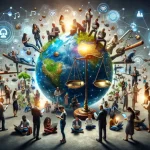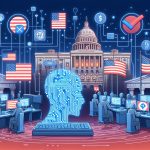Introduction
Power no longer begins with speeches — it starts with screens. Technology has redefined how influence spreads, merging politics, entertainment, and innovation into one continuous conversation. In today’s world, a single viral moment can shift economies, start movements, or redefine public perception.
This merging of digital connectivity and celebrity presence has blurred the old boundaries of authority. Politicians act like influencers, while stars behave like diplomats. The result is a new global stage where power is measured not by office or title but by digital engagement and credibility.
Technology as the Engine of Influence
Technology has become the most powerful tool of persuasion. Governments use AI to track public sentiment, tech giants shape the flow of information, and social media platforms amplify political voices. The digital ecosystem has become a living, reactive force that shapes policy, emotion, and even democracy itself.
But control comes with consequences. When data dictates communication, authenticity becomes rare. True leadership now lies not in dominating algorithms but in using them ethically to empower people rather than manipulate them.
Celebrities as Modern Ambassadors
Celebrities have evolved into unofficial diplomats. Figures like Angelina Jolie, Leonardo DiCaprio, and Greta Thunberg bridge the gap between culture and politics, bringing humanitarian and environmental issues into global focus. Their platforms reach millions, often surpassing the visibility of governments and institutions.
Still, this influence is fragile. Fame fades quickly without credibility, and audiences today demand sincerity. The modern celebrity must combine passion with purpose to remain impactful in a world where visibility changes by the minute.
AI and the Politics of Perception
Artificial intelligence has become the ultimate storyteller. It curates what people see, recommends what they believe, and sometimes even fabricates what appears real. Deepfakes, bot-driven propaganda, and AI-generated content are now political weapons that shape narratives worldwide.
Despite these risks, AI can also enhance transparency. Journalists and watchdogs are using it to detect corruption and misinformation. The challenge lies in balancing innovation with regulation to ensure technology strengthens democracy rather than distorts it.
Social Media and the Rise of Digital Diplomacy
Diplomacy has moved online. Political leaders now use platforms like X and Instagram to communicate directly with global audiences. Tweets can announce policies, calm crises, or spark international debates — sometimes faster than traditional diplomacy can react.
This accessibility has created both connection and chaos. The world’s most powerful figures now operate under constant scrutiny, where one post can change alliances or fuel outrage. Digital diplomacy demands emotional intelligence as much as political experience.
The Global Race for Technological Power
Nations are racing to dominate artificial intelligence, 5G networks, and data infrastructure. These advancements are not just about innovation — they define geopolitical influence. The countries that control digital infrastructure will set the rules for global communication and commerce.
Smaller nations are finding ways to compete by investing in ethical AI, cybersecurity, and digital education. The new world order will favor those who prioritize transparency and adaptability over raw technological control.
Entertainment and Global Narratives
Movies, music, and online content have become vehicles of soft power. Streaming platforms produce shows that subtly reflect national identity, while music stars use their reach to advocate for justice or peace. Pop culture has become the heartbeat of diplomacy, shaping perceptions more effectively than traditional media.
This shift shows that creativity is now a political force. The artists who combine innovation with awareness are not just entertainers — they are influencers of history, using storytelling to challenge systems and inspire collective action.
FAQs
How is technology changing global politics?
Technology has accelerated political communication, giving leaders instant global reach but also increasing misinformation and manipulation risks.
Why are celebrities entering political discussions?
Celebrities have massive platforms and public trust, enabling them to amplify causes and influence global decision-making.
Can AI influence elections?
Yes, AI-driven algorithms and targeted ads can shape voter opinions and behavior, raising ethical and regulatory concerns.
Is social media replacing traditional diplomacy?
Not replacing, but transforming it. Social platforms allow direct communication between leaders and citizens, creating both opportunity and risk.
Why does entertainment matter in politics?
Entertainment shapes public opinion through culture and storytelling, often humanizing complex issues for global audiences.
Conclusion
The age of digital diplomacy and algorithmic influence has arrived. The merging of technology, fame, and politics has created a new power structure where authority is distributed through screens and engagement. In this ecosystem, every post, image, or innovation carries global significance.
To navigate this future, authenticity and accountability must take center stage. Whether in government or entertainment, influence carries responsibility. The true measure of modern power lies not in who dominates the feed — but in who uses it to inform, uplift, and unite the world.









